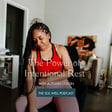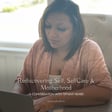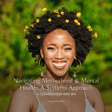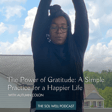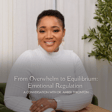Introduction and Podcast Welcome
00:00:05
Speaker
Welcome to the Soul Well Podcast, where moms of color find strength and community in the mental health space.
The Process of Change and Radical Acceptance
00:00:11
Speaker
Each week we ignite inspiration as we set our intentions with affirmations and dive deep into honest conversations with fellow moms and mental health experts. We're here to hold space for you, to shatter stigmas and elevate the voices of moms of color. We'll fight for policy change, empower you with mindful resources, and most importantly,
00:00:31
Speaker
remind you that you're never alone on this journey. It takes a village to raise a mother. Now let's meet at the well.
Anxiety in Black Women: Insights and Challenges
00:00:41
Speaker
Hey mamas, welcome back to the Sew Well podcast. I'm your host Autumn Cologne and this week we are talking about all things anxiety and how it manifests in black women. I am particularly excited about this because I have suffered with anxiety pretty much all my life.
00:00:59
Speaker
And so talking to our guests, it was really impactful and insightful and I'm excited for y'all to listen. Today I'm speaking with Dr. Alicia. She is a licensed clinical psychologist and speaker based in Washington, DC.
00:01:14
Speaker
She received her MA in counseling psychology from Bowie, as well as a master's in doctorate degree in clinical psychology from the University of Hartford. Using the power of social media and her brand Slayer Anxiety to reduce stigma, Dr. Alicia's work centers around assisting assisting people to overcome anxiety,
00:01:36
Speaker
and perfectionism. Hello, that's me. She specializes in providing high performing women with practical tips and skills in pursuit of wellness. And I was delighted to interview her. You're going to love this episode. But before we get started, I want to ground us in an affirmation. And today's affirmation is, I make time to process strong emotions.
00:02:03
Speaker
I make time to process strong emotions. As a collective and community, um people of color are often encouraged to suppress our feelings, deal with our traumas later or never, and to keep it pushing. It's
Stigmas, Mistrust, and Cultural Competence in Mental Health
00:02:21
Speaker
what we've had to do for generations.
00:02:24
Speaker
But not making space to process your emotions can lead to trauma and other mental health consequences that can erode various aspects of your well-being. And so I want you to remember, as you repeat this affirmation to yourself, to feel your feelings and to make time to process your emotions. And with that, we'll jump into today's episode. Dr. Alicia Hodge, welcome, welcome, welcome. Thank you. Thank you. I'm so excited to be here.
00:02:54
Speaker
Yes, I'm so excited to have you here. um This topic in particular is near and dear to my heart because I have personally been struggling with my anxiety since I was a child. um And I'm still on my journey, still finding new ways and and things to help me, things that didn't
Perfectionism and Societal Expectations
00:03:11
Speaker
help me in the past.
00:03:12
Speaker
um are helping me now that I absolutely need to kind of like stay you know centered. So I'm excited because we're talking about anxiety, this episode with you. So can you go ahead and introduce yourself and let our guests know like what you do and highlighting your expertise in the field and about mental health. Yeah, sure. Thank you. So my name is Dr. Alicia.
00:03:35
Speaker
I'm a licensed psychologist. I'm based in Washington, DC, but I actually have a virtual therapy practice, so I serve women in over 35 states, and I do have clients who are international as well. um My specialty, of course, is anxiety. I have found a lot of success in just ah fulfillment and working with anxiety, partially as you shared, because I have had also my own journey.
00:04:05
Speaker
um with anxiety and I do individual therapy. I have groups. I do things like this. I love to sort of just many people as possible by sharing information and tips. And
Coping Mechanisms and Mindfulness
00:04:20
Speaker
so yeah, I think that's my specialty and that's a little bit about me.
00:04:23
Speaker
yeah Awesome. Thank you so much. I love that. And I lost also didn't know that therapists could like practice in multiple different states. Yes. That's something that's a little bit newer since COVID happened. There was of course like a high demand for therapy and a need for access and certain licensing boards got together and gave permissions for different types of therapists. So as a psychologist, I'm able to see people through a bunch of states, they sort of they do a little mini vetting process because it is unethical and illegal to see people outside of your jurisdiction. So we'll talk about therapy later, but that is one thing that I urge people to make sure that someone is actually licensed and qualified to practice therapy. Oh, wow. Yes. Awesome. Yes, definitely. I can't wait to talk about that section.
00:05:11
Speaker
But we're talking about anxiety because we get it, we know what it is, but maybe some of our listeners aren't as aware of like what um anxiety is or maybe the common symptoms of someone that that has been diagnosed with anxiety. Can you define what that is in those common symptoms? Yeah.
00:05:30
Speaker
so anxiety is Firstly, I like to describe that it is a natural and common experience, meaning mostly all of us have experienced anxiety at one time, um and it can range in intensity from something as small as like, oh my gosh, I forgot to send an email, and you know, that you get you get that quick rush, that feeling, all the way to staying up at night worrying about things.
00:05:50
Speaker
And so the symptoms of anxiety do range, however, they include things like physical symptoms, rapid heartbeat, shortness of breath, difficulty concentrating, it can be muscle tension. It really typically manifests mentally in the form of worries. So just ongoing ruminations and a difficulty sort of even stopping those worries and concerns. um But I will say it does impact everyone differently. And so it can be a little bit complex in asking or answering the question of, does someone have an anxiety disorder? I think the important thing is that, like I shared, we've all
Self-Compassion and Creating Supportive Environments
00:06:30
Speaker
experienced anxiety. A disorder is when you have a series of those symptoms persisting for a certain amount of time.
00:06:37
Speaker
in a way that is impacting your functioning, so you're having problems at work or at home, in relationships, and you're finding that it's not easy to resolve on your own. Thank you so much for sharing that because I feel like a lot of people are like, oh, I'm feeling anxious right now, but there's a difference in you know feeling anxious because we all have that. But someone who's actually been diagnosed with, let's say, generalized anxiety disorder,
00:07:03
Speaker
um or something like that like they it's you know there's a little bit more of the chronic i guess you know like exactly persistence of it um thank you so much for sharing that um can you talk a little bit about because this show you know this is for us this is for black women and women of color all across the diaspora Can you talk about how anxiety might manifest differently in Black women as compared to other demographics? Yeah. So what I have found the research and of course my own experience with Black women is that one of the top two things is that it um shows itself as intense irritability.
00:07:43
Speaker
And also a lot of physical symptoms, so muscle tension, fatigue, and sleeplessness. I have found that the majority of my clients, when they come to see me, they're dealing with all, if not one of those things. And typically, I think, you know, there's been a lot of talk around the irritability piece, meaning black women are painted very negatively as having attitudes,
00:08:07
Speaker
as you know not wanting to be bothered, not wanting to deal with things. And oftentimes that is a sign of overwhelm. And so being irritable, of course, makes people leave you alone and it gets pushes them back and gives you some space. So a lot of times when we're anxious and overstimulated, our main objective is to get people away.
00:08:27
Speaker
I love that you, um, talked about, you know, kind of, um, black women and the irritability and some of the things that can get missed, um, or get overlooked as, um, as, but it's actually a symptom of anxiety, like irritability, like, you know, not wanting to be bothered or isolation, um, things like that, um, that we people assume is just, you know, that's just who we are. Like any black woman, she got an attitude. She always got it.
00:08:55
Speaker
rest in face, like, you know what I mean? But like, um you know, they they could be dealing with anxiety and not even, you know, not even, not even, or depression, not even know that it's, it is that because burnout and overwhelm, I feel like for black women, it's just a space that we've always existed in, right? Like this, the need to be the matriarch of the family and hold it all together and hold it down and just kind of like,
00:09:18
Speaker
not show, ah you know, like true emotion, right? Like you just hold it together. And that I think contributes to the like, low, what I want to say, like the not as many women are getting diagnosed because it's they are they're not aware that this is something that is like a symptom of anxiety or something larger.
00:09:40
Speaker
Exactly, exactly. And I think you're making a great point, meaning when someone, um when something is framed as who you are, then ultimately either you accept it or like you said, you're sort of following an imposed stereotype of I get it done, I keep it together,
Community Support and Shared Experiences
00:10:00
Speaker
I don't crumble, I don't ask for help. And that can lead to a lot of stress and chronic stress does lead to burnout.
00:10:08
Speaker
um untreated, untreated anxiety is very impactful. um And it sort of doesn't allow you to see um that they could be different, something could be different. You almost lean into this, I might call it like a learned helplessness or or a hopelessness of like, this is just what it is. And I'm gonna have to figure it out. Yeah, yeah, yes. Wow. Yeah, I agree. 100%. Can you talk about some of the stressors that you see in your want your Black women clients, like anything that you know is a particular and con a contribution to their anxiety, like racism or like societal pressures. I would say um racism right is is always a factor. I think to not include that is a terrible mistake.
00:10:58
Speaker
um I would say that the world that we live in, and unfortunately, is not oriented to embracing who we are as black women. And so there's a lot of double thinking that has to go on when you're at work, when you're outside of the home. And then, of course, you know women deal with a lot of responsibility and things that they have to do within the home. And so I think what I'm realizing is that women, and particularly black women, are not finding a place of respite or having a chance to just rest And so there is an an anxious process of I have to keep going, I have to keep it together, I have to do well at work, I have to do well at home, and I have to always be on. Right, right, right. Oh, yes, that's so true.
Culturally Nuanced Anxiety Diagnosis
00:11:41
Speaker
Like, I have to always be on. Like, I can't accept help because if I do, like, I'm um seen as, we I mean, lesser than, it's like, you know, the Black Superwoman Syndrome, right, that, you know, that happens for us as Black women.
00:11:55
Speaker
Um, and I think it's, um, important to know that earlier you talked about the diagnosis of it, right? Like, how do you get diagnosed with anxiety? Can you talk a little bit about like that diagnosis part and how, um, how like, you know, we talked about how I might go unnoticed and black and brown communities because say, for example, they're going to a psychiatrist or to get an evaluation by someone that is not like they they just don't relate to them potentially, right? Or they're not able to ask the right types of questions. Like how would you say your practice is doing the diagnoses? and Yeah, that's a good question. So, you know, I mean, typically just using a medical model, a diagnosis indicates, you know, you fit a cluster of symptoms. So I am, of course, looking at the formal symptoms and making sure that someone at least is meeting the minimum threshold in the criteria. But I do like to ask nuanced questions.
00:12:52
Speaker
So for example, when I'm thinking about family history, I could easily say to someone like, oh, so does anyone in your family have anxiety? If no one has been treated for anxiety, the answer is no. But I like to ask questions like, does anybody in your family have really bad nerves? Anybody in your family, um you know, really uptight, sometimes I'm asking about substance use, because a lot of people are using substances to calm the anxiety. So things like drinking or smoking,
00:13:20
Speaker
um I will ask, I won't just check the box like, oh, you drink. I wanna know why and what occasions. If someone's telling me like, oh yeah, I'm always making sure I would like go and get a drink really quickly. When I'm in social situations, I wanna know more about that. um And so it's really asking nuanced questions around the function of what you're doing and what people notice and not using in certain like, I would say phrases like, are you anxious?
00:13:47
Speaker
I mean, I think that that you have to take care and sort of figuring out like, what does it look like for you? How does it show up for you? um So I think that my approach is different in general, but especially.
00:13:58
Speaker
with black women, I'm asking sort of like different types of questions to get more information because I think sometimes diagnosis can be a yes, no process and it's not that simple. Yes. and Yes. 100%. And I've been through a number of those questionnaires and the questions that they ask are so in the last two weeks, have you felt? it is and did it is And it's like, to me, I also work in the field as a group facilitator for and mental health practices and substance abuse practices. So sometimes when I am having, like I'm thinking back to my own experience and the experience I want the clients that I'm working with to have, it is about kind of making it about, you know, asking very specific questions. And like you said, like that impact them on a daily life, because I think that those diagnosis
00:14:48
Speaker
forms that I filled out at doctors and it's just so vague. It doesn't really like, I feel like get to the meat of like, okay, what is actually really going on here? It's just kind of like going over a few symptoms and being like, okay, you're diagnosed, you know? So I love the actual approach. Yeah. And even, you know, just to sort of add to that, like you said, the questionnaires are very vague. And so I think exploring with someone, if we just talked about like black women are on in their,
00:15:18
Speaker
trying to just get it done and they're burned out. When you ask someone in the past two weeks, have you felt this, someone's like, girl, I don't even remember what I ate yesterday. Like I, you know? And so it's sort of like really kind of getting down. Like sometimes, you know, I'm not in person right now, but I used to take out ah for a for real calendar and be like, look, last week, you know, did you feel these things just to sort of get people to slow down for a second and really think through what their experience is.
00:15:43
Speaker
Yeah, yeah, I love that. I love that your approach to to therapy, it feels very culturally relevant, very culturally like complicated. Yeah, like therapy, which is something that i ah me as someone in the community and having a platform is wants to share with with the community because it's so important that we receive these types of resources these types of resources so that way more people can get diagnosis and get help and get the support that they need. So thank you for that.
00:16:13
Speaker
Thank you. Can you talk a little bit about m online, you have slay your anxiety. I think that's how I found you. I was like, okay, guess I'm going to slay my anxiety. And you share a little bit about what you mean when you say slay your anxiety.
Slay Your Anxiety: Embracing Cultural Identity
00:16:28
Speaker
with i think Yeah. So I give all the credit to Dr. Joy of therapy for black girls, because she and I are also professional friends. Love her. um I was on her podcast and it was about anxiety.
00:16:43
Speaker
And she actually coined that term, like slaying your anxiety. And I think that it has a double meaning, right? Slaying, like, you know, slay the dragon, but also it's culturally relevant. Like, slay your anxiety. Like, you know, I'm slaying as a black woman. And so.
00:16:58
Speaker
Um, after we finished the podcast, we talked and I was just like, I love this podcast title. And she was just like, take it is yours. Like run with it. And I was like, yes, girl. Um, so I think it's, it, you know, it's literally slaying your anxiety, but I think it's, it's definitely tapping into specifically who I'm speaking to.
00:17:20
Speaker
And what we know slaying to be and kind of looking at it as like showing up and slaying and doing your best. It's not necessarily being on and looking good and pretending, but it's about like, you can you can do both. Like you can be working on your stuff and still be showing up and doing it. And so yeah I think that speaks to the message of like black women and us always wanting to be on and looking good and not showing a weakness, but kind of acknowledging like, this doesn't necessarily have to be phrased as a weakness. This is just what we're working on. Right, right, right. I love that. That's so good. It's like your anxiety. I love it. Can you share some specific
00:18:00
Speaker
um therapeutic approaches that you have found to be like effective in treating anxiety? Yeah, so one thing that I really like to say is that anxiety is a very treatable condition. um That doesn't mean it's easy. That doesn't mean that it is less than any other type of diagnosis. But I say that to say it can be treated in a very straightforward way in terms of practical tips. I'm a big fan of giving people practical tips. I love you know talking through and finding origins and talking about our past.
00:18:32
Speaker
but really people want relief right now. And so so I'm a big fan of physical interventions. And what I mean by that is focusing on what you can do to calm your body. The way that our brains work is that our brain is trying to protect us. And so I'm sure you've heard of fight or flight mode, which is essentially our nervous system's reaction to what we perceive as a threat.
00:18:58
Speaker
Now, if the threat is a lion, that's great. I need to just run. I don't need to think about it. If the threat is an email, it's a little tricky, right? And so I talk to people a lot about how but how can we calm our bodies so that we have a chance to even access our brain enough to then problem solve. It's very difficult to problem solve in a tense, right? Activated state. So I often tell people to think about grounding. What grounding is, it simply means using your senses. Anybody can do it. You don't need a book. You don't need like any tools. You can get yourself to, if possible, like a less active or stimulated space and just ask yourself, what do I see?
00:19:41
Speaker
Do I hear right now? Do I smell anything? I tell some of my clients that keep essential oils or like hand lotion in your purse, put on the lotion, put your hands over your face and just breathe. Breathing is a very strong reset to your body. um And also sometimes I tell people like drink some water, run your wrist under cold water. Just thinking about ways to physically relax yourself before you jump into all that problem solving.
00:20:10
Speaker
Yes, those are all so great. I absolutely love grounding and I love the approach of using your five senses, right? That's so good. you can And you can use that for other things too. Like I've used it to do like gratitude, right? Like what am i'm what am I grateful for, right? Like something I can see, you know, touch, feel.
00:20:29
Speaker
So um I love that approach and it's really easy for someone to do just kind of like right in the moment too. So I hope y'all taking notes. That's a really good like good practice.
00:20:41
Speaker
um And so I wanted to ask like, you know, as a black therapist and serving black and brown women in the community, how do you create a safe and supportive environment for them um coming in in your practice? You know, I will say that I essentially, and correct me wrong if I'm wrong, because you also saw my materials and things like that. I make it clear who I'm serving. I make it clear that that's a part of therapy. like That is a part of you that we're not going to leave out. It's not like an addition or extra like, oh, and also tell me about
00:21:17
Speaker
racism or things like that. It's just in the room with us. And I also think that my style, hopefully my approach is that I'm also embracing my authentic blackness as well in a way that you feel comfortable expressing it. So like, come to your session with your bonded on like, there you you know, and I think even I can see sometimes relief when a person is telling me something that is clearly like a cultural phrase or a song lyric or a thing. and i'm And I'm automatically like, oh, yeah, like I know that song or I know that phrase or did you see that meme or do you remember this? And I think it just creates like an ongoing space of like we are ourselves. And if I don't understand, I truthfully would be like, oh, no, girl I don't know what that is.
00:22:02
Speaker
but it's still very authentic. Like I'm not positioning myself as this expert who knows everything and they don't know anything. It's very cooperative. yeah Yeah. That's so, that's so important to, you know, for black women to seek out.
00:22:17
Speaker
culturally relevant and competent therapist, because there are going to be our colloquialisms that we have just in our culture of like the things that we say. And there, you know, there may be someone that might not be able to understand or decipher yeah but what you're actually trying to say. So that is so, so key, I think, um and anxiety.
00:22:39
Speaker
Um, I want to pivot a little bit like into, you know, cause I'm a mom and most of our audience is
Anxiety Management for Mothers
00:22:45
Speaker
a mom. same Yeah. Yeah. Yes. Okay. How, um, maybe like anxiety manifests through motherhood and ways that moms can, you know, notice them and ways that moms eventually start to get support, um, to help them manage and deal with that. Yeah, absolutely. So.
00:23:07
Speaker
Anxiety and motherhood is a thing um because you are highly invested you know in your child. And so one of the things that I like to explain to women is that your brain, the fear center does undergo a change while you're pregnant. It grows a little bit. And so who you are more fearful, but I think the function of that is to get you more on alert. Like you have a baby to take care of now. You need to be looking out for danger. You need to make sure that you're safe, that they're safe.
00:23:36
Speaker
um But unfortunately, if you were already hyper aware of safety issues, now you are even more so. And so, you know, I do find that moms of all stages, or I don't want to just say it's new moms, there's something to be anxious about throughout your child's life.
00:23:51
Speaker
And I often tell people, how talk about how can we reframe and and pursue like healthy control? Because I think what happens is that anxiety causes you to want to control everything. Sometimes to include your kid, which is not um sustainable or sometimes even reasonable. And so the idea is reminding yourself, I'm highly invested in my child and how do I pursue like a healthier version of what it is that I want to do? so um i I can give an example, even. like So my I'm in the DC area. you know People are signing up for daycare the day they get pregnant. like It's just waiting lists for everything lottery to get in school, like a lot of anxiety provoking things. yeah um And you know I caught myself up at night researching and doing all this stuff. And it was it was really starting to affect me. And I was just like, you know what? It's never too soon to think about these things, but it is too soon to worry.
00:24:42
Speaker
no you know And I kind of refocused on how can I invest my time in giving my child certain experiences and being connected to her and having this relationship versus playing out her life right right from now until she's 20.
00:25:00
Speaker
and it me gonna be yeah ah listen How old is your daughter? She's four. Okay. Yes. So my kids are 10 and 13 and, um,
00:25:12
Speaker
I remember those early days, like how much I was filled and riddled with anxiety to even just take them to the playground. Like it would bring me anxiety that they would be on the playground. Like someone's going to break an arm. Someone's going to kidnap them. Like I just had all of these like fears. And because I was already like hyper aware and anxious and meeting and seeking control, like already before I became calm, it just exasperated that feeling. And I think through the stages of motherhood, it has become I'm better at managing my anxiety because I recognize like, I'm going to have to let go at some point now that they're older. But there are other things that I have anxiety about now, right? Like I have a black, I have a black son in South and Georgia, right? And I, and he, and he's like, he has social, he has social anxiety. So he's not as like, He's very just kind of like chill. He has ADHD. So for him, I worry about my black son going out into the world. That's my new anxiety because he's like, I want to go with my friend to the comic book store and they want to go to this place and then that place. And I'm like, I have to center myself and say he is safe and he's in God's hand. But the feelings are, you know, still there and I have to push through them. So
00:26:24
Speaker
ah local I was going to say, so what kind of advice for moms like me, right? Like that just have to, you know, we have to face so much, like how do we on that? Yeah, I think it's, so some of it is this almost this form of radical acceptance, which is what you did. You were like, this, this, this, but.
00:26:43
Speaker
I would actually change that even to and because I think like language is super important because you know when we say but like I said all that stuff but none of it matters. So almost sort of saying like two things are true and like I'm so worried and maybe the radical acceptance is like I know that he's in God's hands. But also how do I put some of that energy into a regulated myself like you said that's the biggest key as a mom if you're regulated you can show up and be available to parent yeah um in the most ideal way for yourself because you're your're in your more wise mind versus right state, right? um But I would say a lot of it is self-talk, is thinking of through like, what are my worries? And so I'll pursue some healthy control. I will talk to my son, which as all black parents do anyway, I will talk to him about some of the things that I think are important that he needs to know when he's conducting himself outside of our home. I think, you know, and so,
00:27:37
Speaker
It's also then you have evidence to ground yourself in like, I know that the world is a rough place. I know that X, Y, and Z, these things happen. And I'm going to circle back to feeling some reassurance around how we've talked and how we've made even, it doesn't have to be an anxious plan, but like, I need you to stay in communication with me. It's just thinking through like, how can I mother you and protect you and do my job without maybe being so controlling that I am now hyper fixated on either all of the things that you're doing or choosing to keep you from doing things. Yes. Yes. That's so key and so important. And one of the things that you said was radical acceptance. And I know what that is. like I 100% know what that is, but maybe someone listening doesn't understand what what that is. Can you talk talk about or give a description of that?
00:28:26
Speaker
One of the ways that I would describe it is just, um so radical is the key word, meaning you sort of avail yourself and you're open to, I don't want to say the worst case scenario, but you're acknowledging like, yes, this may be like, I don't have control. I have a hard time with that. And I'm going to accept and acknowledge that I don't have control so that I can actually recalibrate and identify where my scope of control is.
00:28:51
Speaker
and how to pursue that. I like to use the word pursue it healthily because there's no such thing as normal. There's really no such thing as like the right way for most things. I kind of think about like, what's the healthiest version of that? So if someone's doing something and they're like, girl, this is not working for me. I'm like, okay, well, what's the healthy version of that? Like, if you constantly checking your kid's location and you messing up at work, what's the healthier version?
00:29:15
Speaker
yeah Is it just checking it five times? you know Is it setting an alarm? But it's sort of thinking through, how can I do this in a less intense way? I'm not looking for people to change overnight. I think change is a process. And so you have to start giving yourself room to explore and think through, what's another version of this? What's an alternative? Yeah. Yeah. I love that. um Radical acceptance is something that I had to personally like learn and understand and accept, especially around like my diagnoses and recognizing that, um, okay, I have this diagnosis and like, I'm going to have it potentially for the rest of my life. And it is about managing and living with this diagnosis as opposed to like being so upset and holding on to the negative energy of like.
00:30:03
Speaker
You know, a woe is me like this is a problem. I'm never gonna get back to how I was I'm never gonna I'm never gonna yeah It's more about accepting. Okay. This is the state. This is who I am. This is my diagnosis. How can I manage and Hope in a healthy way To you know to manage my mind my symptoms and things like that. and So that was my radical acceptance Recently key I think for sure for every anyone dealing with mental health um challenges Yeah, definitely. Because I think what we don't realize is that when we are fighting back against something that is, we are just sort of kicking up more emotional dust and tension, when again, that energy could be used to help yourself differently.
00:30:49
Speaker
Mm hmm. Mm hmm. 100%. 100%. So I want to talk a little bit about stigmas, right? Because we've been talking about black and brown communities and, you know, the things that we face. um Can you talk a little bit about the stigmas surrounding mental health in the black and brown community?
00:31:06
Speaker
Yeah, so stigma is um something I'm very passionate about, meaning I am aware how stigmas cut off access, right? And so when stigma around mental health comes up, especially in the black and brown community, I'm very careful to not just immediately be like, let it go, go to therapy.
00:31:30
Speaker
um That's what I want to say. However, I am aware that the stigma also is not just pulled out of thin air. Right. And so there have been many ways that the black and brown communities have been harmed.
00:31:41
Speaker
um by the medical field, um but also you know I believe that psychology in its essence um was not always has not always been oriented to our specific needs um or even towards treating us specifically um or including us when we're discussing different diagnoses or epidemics or things that go on. I think um I have noticed that more currently and so that does um feel promising. But I do believe that culturally, we are very communal. We believe in rallying and helping one another to solve our problems and not taking it outside of the community and out the house. um And that I think has contributed to a lot of long standing pushback about sharing your inner feelings with a stranger. um And then also, of course, having the experience of sharing those inner feelings with someone who is not culturally competent and kind of
00:32:35
Speaker
being questioned, especially around things like racism and experiences, like, are you sure that happened? and You know, that's not acceptable. And so the stigma is there for a reason. However, comma, my hope is that people can find to identify someone or practitioners who are not going to make that narrative come true. So I think the first thing is like, you have to almost be willing to challenge the narrative, like, okay, well, maybe not all.
00:33:03
Speaker
Maybe it won't be so bad and be open to it. And typically I know that people reach out for therapy in their own timing. and so Acknowledging like this could not be that great or it could be as bad as everyone says it is, but I'm going to make the decision for myself. Um, also us being openly having open discussions about therapy, I think helps. So, you know, you having your podcast, me having using my online platform to be like, look, I'm a regular person. This is what therapy can look like. This is what therapy feels like. I think is really important. Um, and reducing stigma, but I do realize that it's there and it's there for a reason.
00:33:44
Speaker
Yeah, absolutely. Yeah, I feel like it's, you know, like in the community, sometimes you hear the colloquialism of like, oh, pray it away, or, you know, um things like that. And it's like, you know, um maybe we should talk to somebody about that. And I think that a lot of people Um, you know, they feel like they can't, right? Because of the things that you say, like, Oh, we don't talk about this outside of our home. Like, you know, this stays within the family. And then it kind of like perpetuates this like silence around getting the help that you need. And I hope that it is my hope that with more open conversations like this with societies and the culture shifting towards recognizing black mental health. Like, I hope that it continues to kind of.
00:34:28
Speaker
be acknowledged within the community and those stigma start to lift a little bit, but I recognize that they'll, you know, sometimes can always be there, you know. yeah absolutely yeah um Can you talk a little bit about like your upbringing in kind of mental health? like I know you shared that you have mental um you have anxiety. um Has that always been the case for you? What was it like you know growing up? Yeah. um Truthfully, I think I've always been a control seeker as a kid. as a kid
00:34:59
Speaker
um But I do want to talk specifically about the concept of i guess like perfectionism. right and so I'm sure people have heard that term. I think a lot of times when I talk to people um who maybe be I call it operating under the umbrella of perfectionism is the nice little phrase I use. um They're like, oh, not not possible. That's not me. I'm not perfect. like Look at me.
00:35:20
Speaker
you know, I'm in shambles and I'm like, so being a perfectionist is not actually that you're perfect is that you're pursuing perfection and it is bringing you anxiety because you're not going to meet it. um And so ultimately, I would say that's probably one of the better descriptions of how I was operating when I was from a young age. I was a ah top performer at school. I had a lot of promise, right, gifted and talented, all of those things.
00:35:48
Speaker
And I think it just, it set up a narrative of like, you have a lot of promise and you need to see that through. yeah and And also truthfully, right? Like um I'm from Connecticut and so um a very visible minority in that way. And so I'm also carrying like the culture on my back in a way. And so I think that that is a lot of,
00:36:13
Speaker
internal pressure in a narrative that at a young age you cling to. And it starts to just kind of seep into everything that you do and it and it can make you feel um a little unsettled um and and and feeling like you can't fall short. So I think that you know you know that was my experience for a very long time. And the that The tricky thing about that is that you get a lot of praise for being that way. You're like, oh girl, you get all A's, you're this, you're on this team, you're doing all these things. Like you're amazing. And who wouldn't want to let that go? yeah And so unfortunately perfection of perfectionism is not a formal diagnosis at this time. It was presented at one point.
00:36:58
Speaker
um to the APA to be a diagnosis. But what's interesting is that perfectionism, if it had become a true diagnosis, it was gonna fall under the anxiety disorder category because of the significant anxiety that trying to be perfect brings you.
00:37:15
Speaker
And so, yeah, I would say that that was like somewhat my experience. I like joke with my clients. I'm like recovering perfectionism, perfectionist. And I have to do a lot of radical acceptance. I have to do a lot of self-reflection and I have to do a lot of um regulation to not fall back into that pattern of like, I want it to be right. It has to be this way. What will they think? How will I look? Like all of those sort of like questions.
00:37:42
Speaker
Yeah. Yeah. I 100% relate to that just because I'm i'm the eldest. So I was the oldest girl. I was the, you're going to be a lawyer. You're going to like go to the best schools and you're going to have the, and it was like, I always got, I always had streeties, but like I have my siblings, my siblings, like my brother, he didn't. Right. And so he actually got a little bit more attention because for him, it was like me to focus on getting him through school. We know you're good.
00:38:09
Speaker
It perpetuates this kind of like perfectionism, right? Or feeling like your value is tied to what you can achieve, right? Which is what I have done for so long because, you know, like that's how I was raised. It was like, you're going to be the one, but you're the one in the family, like you're going to do this. And holding onto that pressure created this series of anxieties and perfectionism and need for control and overwork and burnout that I have to unlearned right unlearned as an adult that like it's okay to rest it's okay to rest if you you don't have to be a hustler up every day all doing all the things like you can rest yeah absolutely yeah i i often tell people like your worth is not at all found in your productivity it's just not i i get it this is also a message of our society right um but it's actually just like not true
00:39:07
Speaker
Yep, this the capitalism, the society that we live in, this, you know, independent woman, don't mean nobody, get a six-figure job and have a side hustling, be on a PTO, like, ugh. Right, yeah, it's a lot. It's a lot. A lot. So I wanted to talk about next, like, kind of like some practical coping make mechanisms that moms and black women can use just kind of like in their everyday lives. Yeah. um So as I mentioned before, of course, the grounding. um I encourage people to engage in some form of meditation or just get to know more about it and mindfulness just because
00:39:52
Speaker
A, your mind is super powerful and why not practice a way to sort of harness and guide where your mind goes. But I think a big key of mindfulness and meditation is teaching you this art and practice of letting thoughts pass. A big part of anxiety is engaging with all of the thoughts that come into your head and getting wrapped up in them and essentially being pulled out of the present and out of your body.
00:40:17
Speaker
So I like to sort of share the the concept of a thought is just a thought. It only becomes something else when you engage with it. Because I can say the word blue is just a word. But you and I will have different responses to it. You'll be like, oh, blue was my high school color. Or I'll be like, blue makes me think about sadness. But that is something that we've imposed onto to something neutral. And so I think when it comes to mindfulness and meditation, you're learning the skill of, oh, look, there's a thought.
00:40:47
Speaker
I'm going to let it go by. like I'm not going to fight with it. I'm not going to deal with it. And so it's almost like I call it like brain exercise. like can you You get stronger and stronger mentally at saying, like yeah, I could worry about the fact that you know my son is going to the comic store. And you know what? I'm going to let that catastrophic thought pass of like you know some that they're going to accuse him of something.
00:41:13
Speaker
And instead, I'm just gonna think about um either something else, or I'm gonna ground myself. So it's kind of like catching yourself and having this awareness of like, I am oriented in this way, and I know that I know that I can be anxious. So sometimes leading up to things I prepare, like my self talk, I start talking myself to talking to myself already, like, okay, you know, kindergarten is coming up, you know, that you have these concerns, like what are there are some practical things I could do, like make sure I order these uniforms on time.
00:41:43
Speaker
But then there are some other things I can do to just soothe myself and and think about the pluses too. Anxiety is so much about catastrophic, typically thinking, what's the worst case scenario? Oh my gosh, your brain comes up with the story. You start pre-living it. You're anxious upfront. So then you tell yourself like, see, I already feel bad now. It's definitely going to be bad. And it's much more of saying like, you know what? Let's be real. I'm an anxious person. I am telling myself a very anxious story.
00:42:13
Speaker
You don't have to switch the the pendulum and be like, what's the most positive, beautiful story? Because your brain's going to be like, girl, no, I don't believe it. a But I do think it's helpful to say, what's another version of that? Like there's a best case scenario, there's a worst case scenario, and typically it's going to be somewhere in the middle. Right, right. I have yet to have a worst case scenario that has come true exactly the way that I thought it.
00:42:38
Speaker
Right. And so but that's helpful, though, right? Like, I want to be wrong. Maybe some of it came to pass. But I think a lot of um our mindset determines what we see. So if I go into something being like, this is going to be the worst, as soon as something remotely negative happens, I'm like, see, I told y'all. And it's like, well,
00:42:58
Speaker
What if I had gone into it thinking that it was the best? If somebody like spilled coffee on me, I would be like, oh, well that has nothing to do with the fact that I already believe that this is going to be the best day of my life. So you're more easy, like you're likely to dismiss the negativity if you can kind of lean into a different place.
00:43:15
Speaker
Yeah. We're like reframing the thought like in the moment, like, yes, that's so, that's so key. I wanted to talk a little bit now kind of just a little bit about resilience and self-compassion in the face of ongoing stressors, right? Because stress is going to exist.
00:43:33
Speaker
Things are going to happen, right? You're going to, you know, as we get older, your parents age, as you know, you just stress is is happening. Inflation, politics, all the things. Like how can women cultivate ah like just kind of an environment of compassion for themselves in the face of these stressors? Yeah, I am a huge fan of self-compassion. That's actually a piece of therapy that when I was in my training,
00:44:03
Speaker
I was learning about CBT, which is cognitive behavioral therapy. um And cognitive behavioral therapy, is I think, is a great form of therapy. I use it. I swear by it. can It can feel, I think, when someone is not bringing their full self into it as a therapist, it can feel a little bit cold and robotic, like, here's the steps, do the things. And I did some research, and I proposed, like, what if we put self-esteem and compassion into the CBT therapy model?
00:44:32
Speaker
and Well, I didn't write a book about it. I just chose that I was like, that's how I was going to do it in my practice. yeah And so I am a huge fan. um I use the phrase compassion over criticism because self-criticism is a strong element, I think, of anxiety. It's about keeping yourself together. You're looking for all the wrong things. It's a very narrow and rigid style of thinking in which you're just trying to keep yourself in line or the world around you because you're like just criticizing and picking out every negative thing.
00:45:03
Speaker
Self-compassion is so freeing because it's the concept that you make the rules. right You can give yourself grace, you can give yourself space. um Other than like the laws, there's no right way to do anything. right And so I think if we can see ourselves in this open way, it can be scary at first because you're like, well, what do you mean? I was beating myself down this whole time or like I was following all these rules.
00:45:28
Speaker
but it's very empowering to be like I make the rules so I can like lovingly embrace myself and have compassion not only for myself but for others and typically I think people do the reverse like once you can extend more compassion to other people you can do it for yourself but I'm encouraging people to do it simultaneously especially I find when women have children I will say what would you have done if you're or said if your child did that. And they're like, oh, I would say it was fine. like It's okay, you're a great person. And I'm like, hmm, that's interesting. Because I want i also wanna prove, girl, you know how to do this. right right You're just having a hard time doing it for yourself and that's okay, we'll work on it. But I do wanna let you know, like you have the capacity for compassion. You just haven't practiced it on yourself.
00:46:22
Speaker
yeah Yeah. Yes. That's, that's so key. I love that you even brought up the fact about like, what would you say to your kid? Because that to me is always kind of like and a thing that I try to practice because I have a daughter and I'm like, she's really confident and she has her affirmations and she's like, you know, and that's because I speak life into her, but sometimes my negative self-talk is like telling me all the opposite things. And I have to tell myself like,
00:46:48
Speaker
Would you say this to your daughter? like would you what Or what would you say to your daughter in this situation? right And like kind of kind of like flip the script. I've even like wrote a letter to my to my younger self, but like I pretended it was my daughter right because I have so much love and compassion for her. But it's like as as moms, we need to put ourselves at the top of the list. but you know because we We need to prioritize loving and giving ourselves grace.
00:47:15
Speaker
so that we can show up as our best selves for our kids. um But ah you know I feel like I recognize for a lot of women that might be hard. And i very hard unlearning that behavior from years of doing it can be difficult. Definitely. I think even like the phrase, right I had a conversation with someone that like the phrase unlearning sounds so simple.
00:47:36
Speaker
But I mean, the idea is that that means you got to learn something else. So it's not like you're just not like I'm just forgetting something. Like that means I got to learn something else. And so everything we do is practice. And so, you know, I'm not a bodybuilder, but I love the phrase, like one day the warm up, what is it? One day the work workout will be the warm up. I might be saying that wrong.
00:48:04
Speaker
But it's essentially this idea of like, it feels really hard at first, but the more you do it and the more conditioned you are, you will be like, oh, like, you know, my old workout is now my warmup. Like, this is my workout. I can do this. it's Like, this is nothing. I can do this, right? um So what kind of resources would you recommend for Black women seeking support for anxiety? Do you have any that you typically recommend when you start working with your clients? You know, it's funny you say that because in all of my years of work, I tend to draw a blank when people ask me that question. There's a, and maybe that's a call to fill the gap, right? But I think that there's a lot of like very accessible, like small communities for depression and like, and I mean like, ah
00:48:52
Speaker
just even more like millennial based, like culturally relevant. Like there's like the Sat Girls Club, Sadie baddies, like all of these cute and like helpful things. And I was just like, you know what, maybe I need to make like anxious baddies or like anxiety serious because I don't have like one specific place to go. I mean, of course come to my Instagram page.
00:49:09
Speaker
yeah yeah And I will say, I encourage people to curate, like the algorithm is strong, right? I encourage people to curate your feed, even if you want to have like a little fence or something like that. get an Get a social media account if that is your thing and only search for like affirmation affirmations, those like calming visual scenes, whatever it is that you like, like I love seeing scenes with water and flowers, or if you like ASMR, whatever it is, feed the algorithm so that that can be a place that you go. That's for you. Because I think that's the other piece that um there's a lot of like prescriptive
00:49:51
Speaker
five steps to feel better type of things. And I love those. like I love those are good starting points. But the truth is, is that things need to be very individualized. That's why I am a fan of therapy. like Once I get to know you, I can make it just for you. right But I tell people, like curate your environment. Think about self-talk. Think about affirmations. think about Think about the things that you like that make you feel good and grounded.
00:50:14
Speaker
And those create like a safe space within yourself and for yourself. like My ultimate goal for people is like I want you to be your safe space. um And that takes a lot of work. But I also think that it's like a huge investment that's really worth it.
00:50:29
Speaker
Yeah, 100 percent. if You're going to get so much out of taking care of yourself, right? So much like longevity and joy out of doing just that. and And I love that you mentioned the curation of your feed because face it, like social media is not going away. People are going to engage. People are going to be online chronically.
00:50:48
Speaker
And, you know, social media breaks are great, but you're gonna probably go back to it, right? Like, it begins a lot for the job, so curate your environment. Like, if you're following people that are negative, like, mute them. If you, are you know what I mean? Like, curate the algorithm. It listens. It listens to what you, what you like. As heavily and quickly.
00:51:08
Speaker
So it was hard to show you things, you know, you know, to inspire you or uplift you or even if you want to need some affirmations and you're not really sure, you can follow pages for that. So I love that you mentioned that as like a really practical resource because we're going to scroll. Right. So let's scroll and and put some positive and some resources into our into our. atmosphere um Yeah, I love that. So I, you know, just to kind of close out um the episode, i would what kind of like message of encouragement and hope do you offer to women struggling with anxiety, dealing with a recent diagnosis, or just living with anxiety? What would you offer as encouragement?
00:51:50
Speaker
Yeah. i would The encouragement that I would offer is there is help available, right? So I think that essentially, but I think when we're very overstimulated, overwhelmed, we almost kind of believe like this is kind of hopeless. Like there is no end in sight. Like I'm just going to have to figure this out or potentially like a fear that I might crumble. And I I want people to know, like a lot of times people ask me the question of like, when should I get help? Or it's when you think you need help. You know, the first time you think it, not the fifth time, the first time you think this is not sustainable, this is not me. Or, you know, you have that, that intuition, I would say start looking. And I know that looking for therapy is a really difficult, it can be a really difficult process. Like logistically,
00:52:41
Speaker
psychologically, like emotionally, um you know, to even admit and acknowledge like, I need help with this. But I encourage people, the first inclination that you need help, try to give yourself compassion and say like, okay, I need help. And look for it. um Also, I would encourage people, one of the things about us, right, if we are community people, try to identify your community.
00:53:05
Speaker
um I'm a huge fan of like being your therapist and being that support, but I'm always also pushing my clients towards friends, family. and whoever, because I know that having natural support is key. Having people that you can talk to, that you can go to, um who you know are there for you is a big deal, and that's just, I think, a part of our culture, right? yeah The other thing that I would say, just as hopefulness and words of wisdom, if you will, is you're not alone. I have anxiety groups, and i I love having groups as well, because other women, and like, you can see their faces, like,
00:53:44
Speaker
That happened to you? Like, really? like isn't It's important to to not be in that critical space and be like, it's only me. Nobody would get it. You know, this is silly. I think the the the thing about anxiety is we can intellectually say that worry is silly or that should not be something that's keeping me up at night sometimes. And I think it it feeds into that critical loop of like, oh, this is dumb. Like, I don't want to talk to anybody about it. like is so silly for me to be worried about this. But I think if anything, that's a sign to you of like, well, if it's silly and I'm that preoccupied with it, like maybe I just need some help with it because maybe it's easily overcome. It's not that serious.
00:54:26
Speaker
Right, right. like yeah like And I love that you mentioned groups. I think that in communal and finding your village and getting the support that you need and reaching out for it. um Because I feel like sometimes the society will teach us a lot that like you can do it by yourself, or you don't need help, or you're independent. And it's like, no, actually, like we thrive in communal environments.
00:54:49
Speaker
and getting support that we need. And so mo like similar to yours, like I encourage women to like ask for the help if you need it, especially as it relates to to anxiety. Any kind of ways that our guests can connect with you online, like how could they work with you? how what What do you have going on related to anxiety? We'd love to hear it all. Just kind of share all the things.
00:55:18
Speaker
Okay, yeah, so this is a we're rolling into a popular season for therapists, meaning, you know, during the summer, everyone's busy, the sun's out, we all feel good. um And then typically, like, you know, when the school starts back up and the sun goes away, people are like, okay, it's time. So I actually do tend to have a lot more offerings in the fall. um So for starters, my website is www.slayeranxiety dot.com.
00:55:46
Speaker
um And you can find out information about myself. um There's a link to my actual practice. I do speaking, I do workshops and things like that. If people want to connect with me for different resources, I will be having a a group in the fall called Anxiety Bootcamp. And that is a group for people who may be newer to the experience or just, you know, maybe they're not quite ready for individual therapy. And they're just like, I want to understand what anxiety is and how to get a hold of it. I think it's a good intro into what therapy can be like. It's a group of other women. um It is virtual and we spend time kind of going through what we talked about. What is anxiety? How does it look for me and how do I manage it? At the end of that group, some people are like, thank you. That was amazing. Other people are like, sign me up for the therapy.
00:56:34
Speaker
and love um And I also, it's interesting that we talked about this. I actually have been thinking about starting like just a small community on Instagram. that features just like extended tips and an ability to kind of talk more. It's not therapy, but just kind of to talk more about like how how anxiety has shown up in their lives in ways that they want to manage it. But also for individual therapy, you know, you can go to my website. you My Instagram is help me Hodge, like my last name. um But yeah, I think my answer, my handle help me Hodge is like across all social media. So like TikTok, LinkedIn,
00:57:14
Speaker
But um there I'm there. I'm very searchable. You can find me on a podcast here and there. But I do have this desire to reach more of the masses of people. I love in individual therapy. I love the one-to-one change, but I do have this big just push and desire, like, this is information that everybody needs. So I am i am i have my mind brewing around, like, a YouTube or something like that, but I haven't announced it yet. So we'll see. happen By the time it's come out, like, you know, right. Right. where Right.
Resources, Affirmations, and Closing Messages
00:57:44
Speaker
on Might be in your notes. Right. Might be in my notes. Right. Exactly. So all the links and everything that you mentioned today on this episode, we're going to leave in the show notes for our guests to be able to connect with you or work with you or just follow your page for resources and tips and inspiration um so they can slay their anxiety. And I thank you so much for coming on the show.
00:58:05
Speaker
um And we always do like a bonus part of our episode where we ask our guests to share a scripture, a quote, an intention or affirmation to read for our guests. Okay. So I would say I have an affirmation. I do speak in hyperbole at times, but this affirmation for me was absolutely life-changing in the sense of it fixated in my mind on like me and worth.
00:58:34
Speaker
and myself and not trying to be far in the future. And that is, I don't chase, I attract. And I love that affirmation because I think it goes for anything. It keeps you in the posture of just being yourself and being present and not leaning forward and being too controlling. um And just like the things that I need will come to me. um I don't have to chase it. I don't have to do too much. I could just exist and be and know that I'll be taken care of.
00:59:02
Speaker
Yes, that's so beautiful. It can just exist in my space and be me wherever I am and be present. And it will come to me. That's so beautiful. Thank you for sharing that. And thank you for sharing all the tips that you shared today about anxiety. I hope that our guests learn something, can take something away. um Like I said, I appreciate you being here. Thank you. i I appreciate you inviting me. I was very excited and looking forward to being here.
00:59:26
Speaker
Yeah, thank you so much. And all right, this is the end of our episode. I hope you heal well and I will see you next week on the solo podcast. Bye. Hit the notification bell wherever you are listening to us today and join us next week as we delve into more mental health conversations.
00:59:48
Speaker
The Sew Well community offers a safe ground for the transformative healing and restoration of intergenerational trauma, ensuring moms of color have a space to rewrite their stories, recover, live well, be seen and heard. Join us online and on Instagram at Sew Well for daily inspiration, blogs, events, and more. See you next time.



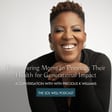
![Life after [baby] loss A conversation with Alishia Anderson image](https://media.zencastr.com/cdn-cgi/image/width=112,quality=85/image-files/61fb5028559b7100aee9f217/492cabf0-4479-488c-b19c-2873fe6bdce8.png)


